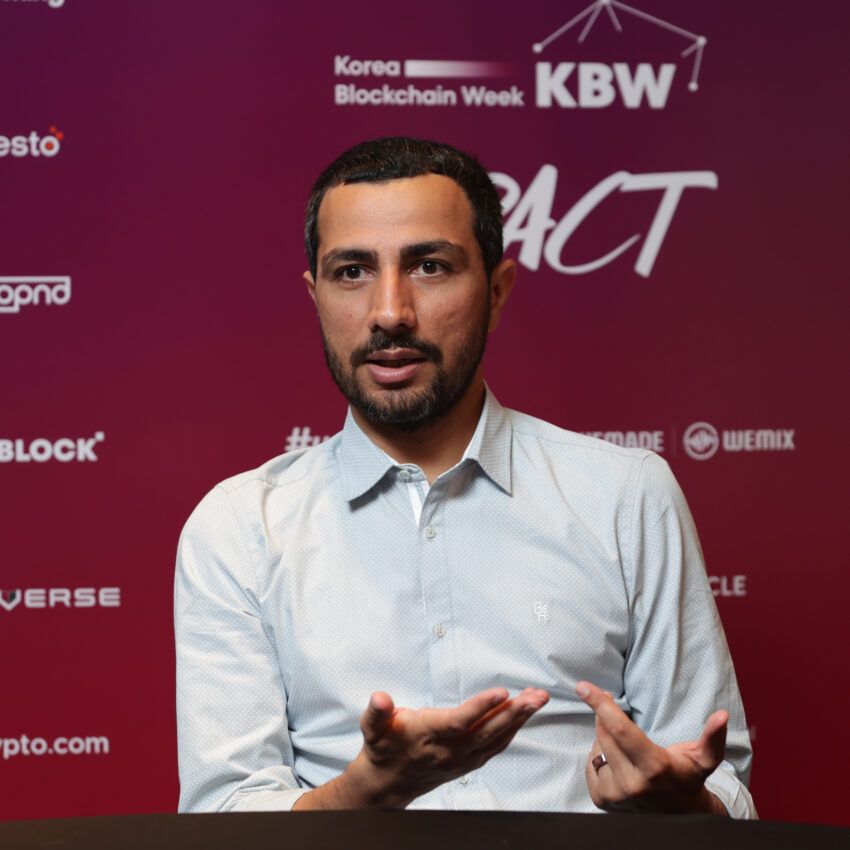Stacks (STX) is currently positioning itself as a decentralized finance platform built on Bitcoin. The platform’s co-founder, Muneeb Ali, recently discussed his insights about the platform and Bitcoin-based DeFi with BeInCrypto.
The DeFi platform is consistent with its initial goal, but it has become more focused. The Nakamoto Release, which is in progress and slated for the first quarter of next year, will bring this goal to fruition.
Stacks Co-Founder Suggests How Platform Can Solve Bitcoin Limitations
Muneeb Ali, co-founder of Stacks, who visited Korea on the Sept. 5 to attend the Korea Blockchain Week (KBW) event, said:
“If you can develop something on Ethereum using the Solidity language, you can develop the same thing on Stacks using the Clarity language. But it is much safer in terms of security.”
Click here to learn more about the Bitcoin (BTC) network.
Ali highlighted the limitations of the Bitcoin network and how they could be overcome with Stacks. The aim is to offer faster speeds and lower fees through Layer 2, and to make it easy to transfer funds between Layer 1 and Layer 2.
The following is the full interview with founder Muneeb Ali.

When will the new upgrade come out? Some say it may be delayed.
“Because Stack is a decentralized ecosystem, there is no entity that can independently perform upgrades like Solana’s Solana Labs. Stacks was forced to decentralize before the mainnet launch while conducting an initial coin offering (ICO) approved by the US Securities and Exchange Commission (SEC). So, it is only composed of individual developers.
“If there was any delay, it was because of that reason. Over the past few months, I’ve spent a lot of time contacting these developers individually. In 2022, we created a company called Trust Machine to develop Bitcoin applications, and we also plan to support developers in the ecosystem.
“It is similar to Linux, but open source development is not about someone working under someone else. “I’m glad that the ecosystem is learning how to work together.”
Importance of Bitcoin DeFi
Stacks has a close relationship with Bitcoin users. Some of these so-called Bitcoin Maximalists are negative about Bitcoin DeFi. Still, why is Bitcoin DeFi necessary?
“The group called Bitcoin Maximalists is quite large. They treat Bitcoin like a religion, hating not only what we do but the direction in which the entire industry is moving.
“But there’s nothing they can do. They also criticized Ordinals, but they actually did nothing. Maximalists have nothing new to talk about. Just repeating the same thing over and over again. There are no developers or funds. If there are 1,000 Bitcoin Maximalists on Twitter, there will be 2,000 to 3,000 people paying attention to us, and if we hold a developer conference right next to the Maximalist event, many more will come.
Click here to learn more about Bitcoin Ordinals
“Going forward, there are only three options available at the highest (decision-making) point. First, there is a camp that chooses the most preferred Layer 2, whether it is Arbitrum or Optimism in Ethereum. Second, there is a camp that chooses alternative Layer 1 such as Solana and Avalanche. Third, there is a camp that chooses Layer 2, which is built around the Bitcoin ecosystem. “The process of making various choices in the future will be very interesting.”
Once the Bitcoin spot ETF is introduced, financial products linked to Bitcoin will become possible without DeFi. Do you see Stax competing with them?
“Bitcoin does not have a programming language for developers. You cannot create a stablecoin at Layer 1, nor can you create a lending protocol. The only way to create financial products was to centralize them. ETFs will bring widespread interest in Bitcoin.”
The Impact of KYC
There are voices calling for obligations such as customer identity verification (KYC) and anti-money laundering (AML) for DeFi. Could Bitcoin Layer 2 also face similar demands?
“Bitcoin’s position is clear in terms of regulation. It’s not a security. The transaction details are also clear. If large corporations such as pension funds and listed companies hold cryptocurrencies, Bitcoin will make up most of their portfolio. Because of that clarity, people who deliberately try to scam people don’t choose it. “The Bitcoin community has a culture of distrusting and rejecting anything too experimental, so situations like ‘free money’ are not welcomed.”
What do you think about the attitude of Bitcoin maximalists?
“The good thing about Bitcoin is that as Layer 1, it is very stable and provides a reliable foundation to build things on. I wish Bitcoin would remain the same without changing or upgrading.
A Community That Doesn’t Listen Is Immature
“Bitcoin’s bad points are the same. A community that refuses to listen is immature, and its infrastructure is inadequate. There isn’t much money either. On the other hand, Ethereum has a culture of experimentation, so it moves quickly and creates new things. Bring in more developers and have more money. As Layer 2, Stacks will enable more experiments and upgrades to attract more people while maintaining the security of Layer 1.
What does the Korean market mean to the future Stacks and Trust Machine roadmap?
“Trust Machine launched a Bitcoin wallet service called leather.io last week. I hope it will be used like Bitcoin’s MetaMask. It is a wallet that can be used for everything, whether it is cold storage, smart contract, stablecoin, or NFT. I hope there will be a lot of interest in Korea as well.
“From Stax’s perspective, Korea is a mysterious market. On any given day of the year, at least 60% of STX trading volume comes from Korea. Sometimes it goes up to 70-80%. Since we are not doing any special activities in Korea, this is a purely organic number. I don’t know why. Personally, I really want to know what happens. “We are trying to communicate with the local community.”
Do you have anything to say about BeInCrypto’s interview with Stacks Founder Muneeb Ali or anything else? Write to us or join the discussion on our Telegram channel. You can also catch us on TikTok, Facebook, or X (Twitter).
For BeInCrypto’s latest Bitcoin (BTC) analysis, click here.
Disclaimer
In adherence to the Trust Project guidelines, BeInCrypto is committed to unbiased, transparent reporting. This news article aims to provide accurate, timely information. However, readers are advised to verify facts independently and consult with a professional before making any decisions based on this content. Please note that our Terms and Conditions, Privacy Policy, and Disclaimers have been updated.


